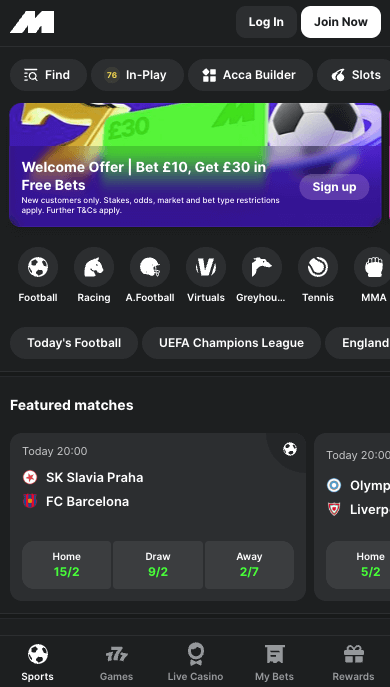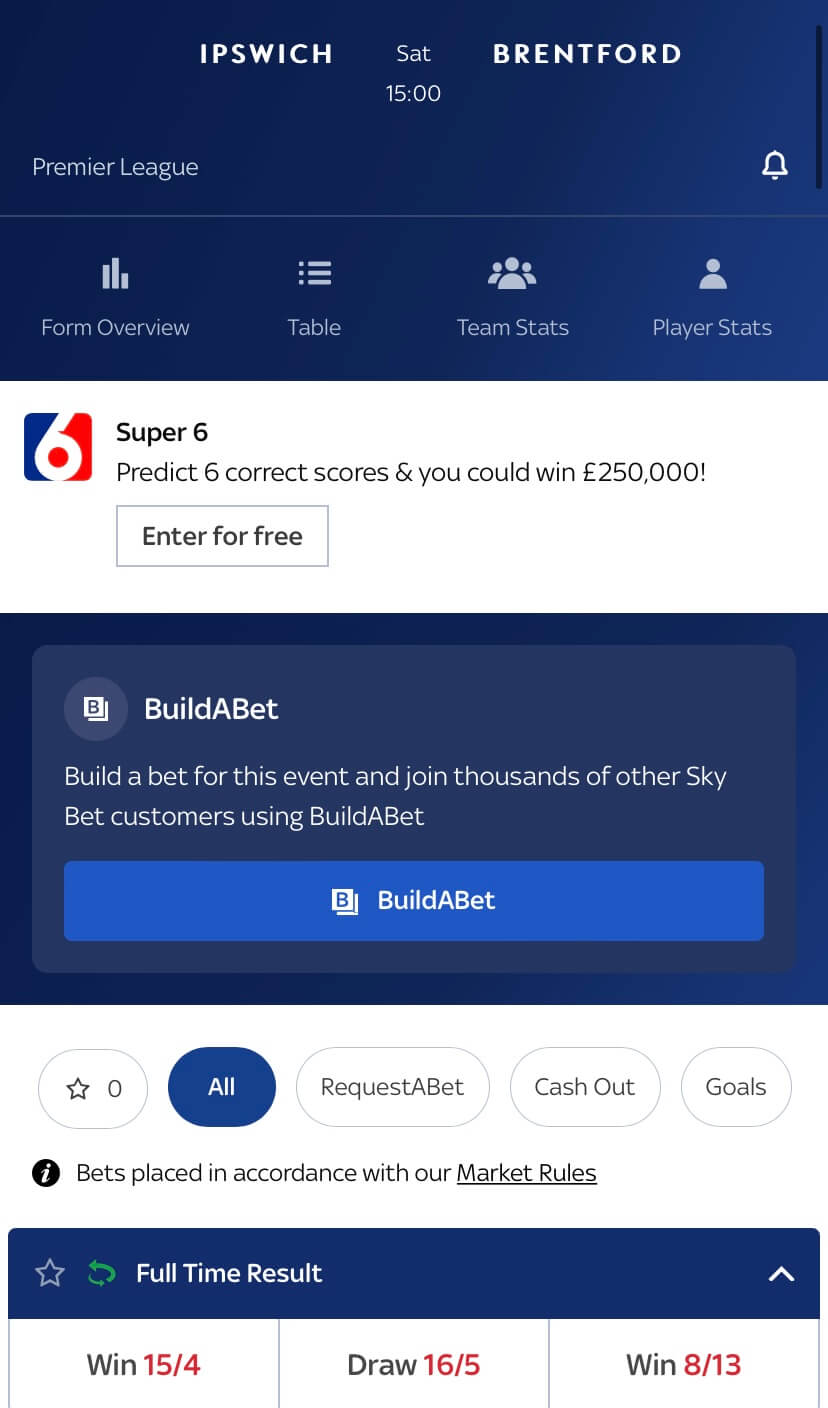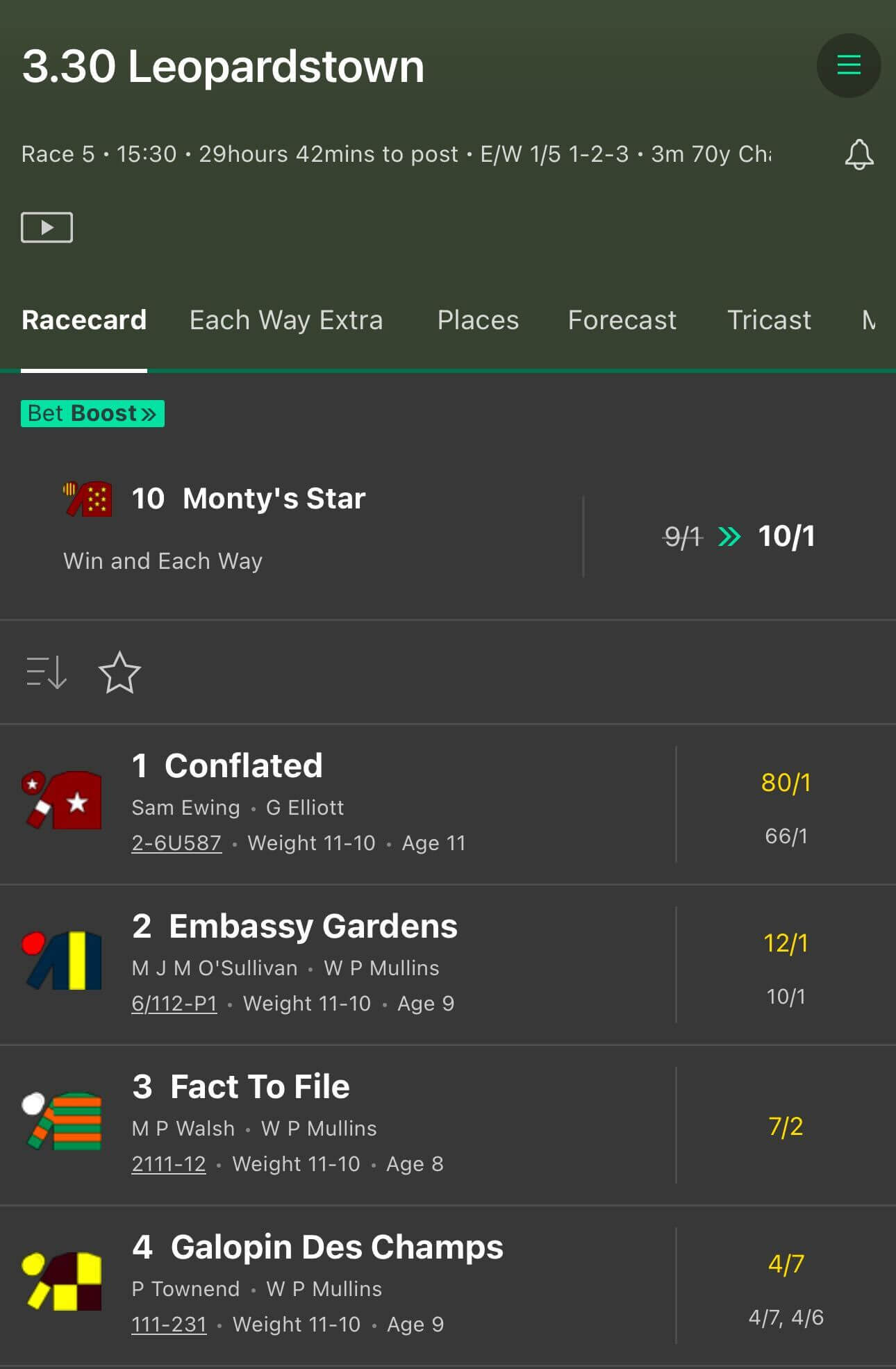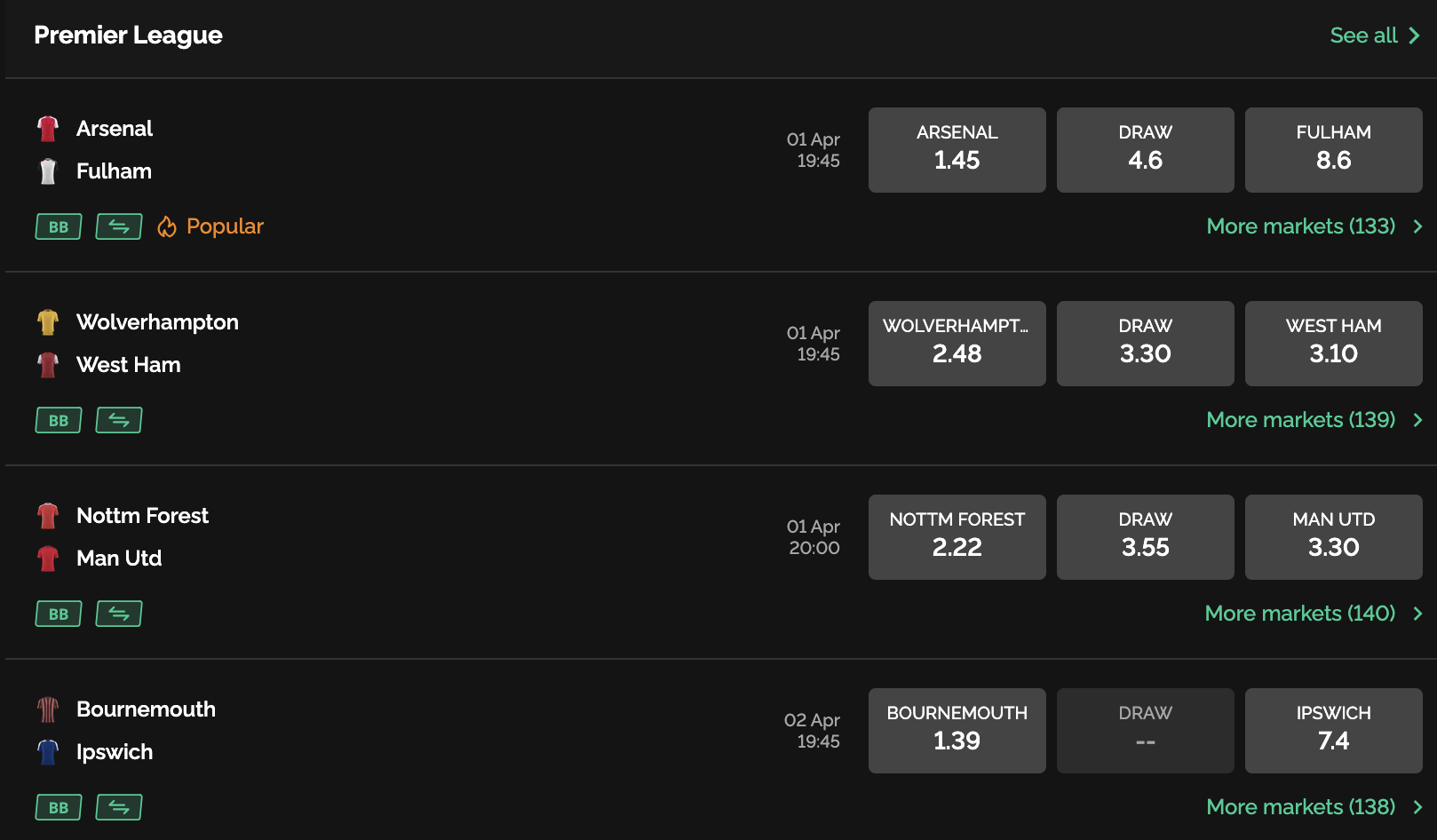If you’re new to betting, one of the first things you should do is learn how betting odds work and what betting odds mean. It’s important because it allows you to understand how likely an event is to happen, and what your potential winnings will be. We’re here to help with our betting odds explainer.
What are Betting Odds?
Betting odds represent the probability of an event happening. Once you know the betting odds, you can calculate how much money you would receive if your bet wins. As an example, if betting sites set odds of 9/2 for Slavia Prague to draw with Barcelona, it means you’d win £45 profit from a £10 bet if they win.
You can use our odds converter to see that the betting odds of 9/2 convert into an implied probability of 18%.

Using Betting Odds to Calculate Probability
Betting provides you with an insight into how likely the outcome of a certain event is. If you believe the probability is greater than that, it may be worth placing a bet. If your prediction is correct, you can win money.
For any given event, there are a certain number of outcomes. Take rolling a dice for instance. If someone rolls a dice, there are six possible outcomes. Therefore, if you bet that the person rolls a ‘one’, there is a 16.67% chance that will happen.
Whenever you see two numbers separated by a slash mark, i.e. 4/1, this is known as fractional odds. From this, you can calculate how likely a given event is to happen with a calculation. For ease of explanation, let’s replace the numbers with letters i.e. 4/1 becomes A/B. Here is the calculation: Probability (%) = B / (A+B).
| Odds | Calculation | Answer |
| 9/1 | 1 / (9 + 1) = 0.10 | There is a 10% chance that the event will happen. |
| 4/1 | 1 / (4 + 1) = 0.20 | There is a 20% chance that the event will happen. |
| 1/1 | 1 / (1 + 1) = 0.50 | There is a 50% chance that the event will happen. |
| 1/4 | 4 / (4 + 1) = 0.80 | There is an 80% chance that the event will happen. |
Given the fractional odds, we can now tell how likely it is that what we’re going to bet on will happen. Now let’s figure out how much money can be won using betting odds.
How to Read Betting Odds
So, we’ve taken you through how to calculate winnings through betting odds and through probability, but you might still be wondering, how do you read betting odds? It’s a relatively simple process.
When it comes to fractional odds, they tell you your potential winnings based on the amount you’d be staking on the bet you’re placing. A good example would be if you were betting on a market with odds of 10/1. If you placed a £1 bet on those odds of 10/1, and are lucky enough to see the bet as a winner, then you’ll be paid out £11 in total, which includes your £1 original stake.
Below, you’ll find some other examples of how to read betting odds, in what will become a simpler process as you gain more experience in betting.
- 8/1 for every £1 bet = £8 profit plus £1 stake.
- 11/2 for every £2 bet = £11 profit plus £2 stake. (For every £1 bet = £5.50 profit plus £1 stake.)
- 1/2 for every £2 bet = £1 profit plus £2 stake.
If the first number in fractional odds is smaller than the second number, then it means that the selection is ‘odds on’. In this case, betting sites rate the likelihood as greater than 50%. If the number to the left of the dash is bigger than the number to the right, then the selection is odds against, and has less than 50% chance of success.
So in the example below, you can see Brentford are odds on at 8/13, which means they have a larger than 50% chance of winning. They were performing well in the Premier League during the 2024/25 season, whilst Ipswich were battling relegation, so it’s easy to see why Brentford had the bigger chance of winning.

How do Decimal Odds work in betting?
Decimals are most commonly seen as the default layout on betting exchanges, such as Betfair, but all UK betting sites do give you the option to view betting odds in this format. They are an alternative to seeing betting odds in the fraction format, and in our opinion, are easier to work out. Here is the calculation: winnings = (odds x stake) – stake. Let’s show you exactly how they work with some examples
- 9.0 can be calculated as (9.0 x £10 stake) – £10 stake = £80 winnings.
- 4.0 can be calculated as (4.0 x £10 stake) – £10 stake = £30 winnings.
- 2.5 can be calculated as (2.5 x £10 stake) – £10 stake = £15 winnings.
- 1.25 can be calculated as (1.25 x £10 stake) – £10 stake = £2.50 winnings.
Below is an example of how decimal odds look like on betting bet365.

Are betting odds the same everywhere?
Although different bookmakers normally agree on which team should be the favourite to win a specific match, the odds can actually vary quite significantly. Whereas some sites may prefer to focus on promotions to encourage their customers to bet, others make competitive odds one of their USPs, ensuring they’re offering the best odds in the industry on big events.
The UK Bookmaker Awards analysed masses of data to conclude that SBK offer the best football odds around, with bet365 given the equivalent accolade for horse racing. AK Bets are another that are well-known for their aggressive pricing stratey, so all three should be top of your list when shopping around for the best odds.
Decimal Odds vs Fractional Odds
One way isn’t better than the other but there is certainly a trend emerging towards using decimal odds. Traditionally, fractional odds have been used in the UK, especially at racecourses and on the high street. There are two key differences.
Generally, decimal odds are easier to understand. Based on this, there has been a movement to attract more people to horse racing by making it more accessible to the average punter. Ten years ago, if you were going to Glorious Goodwood or placing a bet with your chosen bookmaker on the Cheltenham Festival, all the odds would be displayed as fractional odds. Now, they’re largely all in decimals.
The second difference between the formats is that fractional odds only represent winnings, and do not include the returned stake compared to decimals which do include the stake. The transition from fractional odds to decimals largely kicked off with the growing popularity of betting exchanges such as Betfair.
Betting Example
To make all this information slightly easier to understand, here is a quick example of a bet.
If you were backing Chelsea to beat Everton 2-1 in their Premier League match, you might see the odds of that outcome at 15.0 (decimal) or 14/1 (fractional)
You can immediately work out how much your potential winnings would be if your stake was £10:
- 15.0 can be calculated as 15.0 * £10 stake – £10 = £140 winnings
- 14/1 for every £1 you bet you win £14 – £140 winnings
- Remember, you will receive your original stake back as well, so in this, the overall return is £150.
You can also use our bet calculator to help you calculate winnings.
Using Betting Odds to Calculate Winnings
Betting odds allow you to calculate how much money you will win if you make a bet. Let’s use the same examples as before, with the same replacement of numbers for letters, i.e. 4/1 becomes A/B. Quite simply, for every value of B that you bet, you will win A, plus the return of your stake.
- 9/1 for every £1 you bet, you will win £9.
- 4/1 for every £1 you bet, you will win £4.
- 1/1 for every £1 you bet, you will win £1.
- 1/4 for every £4 you bet, you will win £1.
Use our Odds Converter tool to find your favourite format
You may find that your favourite online betting site presents the odds exactly how you likely them to be. But sometimes you might need to convert them to understand.
Our odds converter tool will allow you to see odds in whatever format you like. Not only that, but it’ll tell you how likely the selection is to win!
What are Good Odds?
There isn’t a correct answer here, as each punter will have a rough idea on what good odds are with their chosen betting site. Goods odds depend on the betting market that the odds are available on, as some value can be found on certain selections that aren’t available with other bookmakers.
Good odds could be looked at as the best value for your money. If one bookmaker, such as bet365, is offering relatively short odds on a certain selection that is available at much higher odds elsewhere. Then this represents good odds with the bookmaker that is offering more for your money with the greater odds.
Horse Racing Odds Explained
Horse racing odds are relatively simple to understand, but we’ve provided some examples to make it easy for bettors who are less experienced with understanding odds.
| Horse Racing Odds | Horse Racing Odds Explained |
| 3/1 | For every 1 unit you stake, you’ll receive 3 units if you win (plus your stake). |
| 11/2 | For every 2 units you stake, you’ll receive 11 units if you win (plus your stake). |
| 9/4 | For every 4 units you stake, you’ll receive 9 units if you win (plus your stake) |
Horse racing odds are displayed in either a fraction or decimal and each punter will have their own preference as to what they like to see displayed with their chosen operator’s site. In horse racing, there is always a favourite in a race, and they’ll have the shortest price compared to the rest of the field.
They’ll also have an ‘F’ visible next to their odds, which stands for favourite, so punters that are unfamiliar with horse racing betting will know which horse is the favourite to win the race.
Best betting site For Horse Racing Odds?
When it comes to horse racing odds, bet365 are our favourites. The betting site claimed awards such as Best Horse Racing Odds, Best User Experience, and Best Sports Bookmaker and the latest UK Bookmakers Awards. With such good odds and also existing customer offers for horse racing including bet boosts, bet365 are the best site to go to for horse racing odds.
Below is an example of how their site is set up for horse racing odds, remember that these odds are subject to change and were correct on 1/2/25.

Football Betting Explained
Football is one of the most popular sports for bettors to wager their funds on, and with matches taking place throughout the year, and on a daily basis, it’s understandable as to why it’s so popular amongst punters. They can bet on many different betting markets that are accessible with the majority of leading football betting sites, and with potential value in and around certain selections, finding the best football betting odds is crucial for punters who are looking to get the best value for their money.
Not all bookmakers have the same betting markets available though, as some lack as much depth as others, which means that there is sometimes much more value to be found with the betting site that covers a considerable amount more depth within their betting markets. Below, we’ve listed some of the most popular types of football bets that can be placed with the majority of leading bookmakers.
| Type of Football Bet | Football Bet Explained |
| Match Bets | Most popular type of bet to place on football, as you’re predicting what the outcome of a certain match will be. Some bookies offer different odds on each selection though, so it’s worth looking around in search of potential value within the betting odds offered by various betting sites. |
| Bet Builder Bets | The bet builder feature is one that is hugely popular amongst bettors, as they can combine multiple selections on the same event to form one single bet. Therefore, there can be a potential value within the odds, which makes it understandable why it’s so popular. |
| Player/Team Props | With it being relatively new in terms of the depth that is covered, it won’t come as a surprise to hear that not all bookies offer this type of betting market. These are sometimes referred to as statistical-based betting markets, as you’re wagering your funds on players or teams to have a certain statistic during a match. Some bookmakers have different lines and odds available on prop markets, so it’s an area where punters can find some value. |
| Accumulators | Football accumulators are placed on a regular basis by punters and with the prospect of winning a sizeable amount, it’s understandable as to why they’re so popular. However, some of the best betting sites out there for accumulator betting offer accumulator boosts, which give punters a bonus amount that is added to the original potential returns of the bet. |
| In-Play/Live Betting | This is an area where punters can find value for their money, especially if they have accounts with many different betting sites. Bookies don’t price betting markets at the same odds across the board, and so with the fast-paced nature of football matches, scenarios can change frequently, which means that if they’re quick enough, bettors can find some value. Expect this to be a major feature for fans during the World Cup, with almost all games attracting a large TV audience. |
Best betting sites for Football Odds
Like in horse racing, bet365 are seen as one of the best betting sites for football betting odds, whilst Sky Bet are another betting site with good football odds. The latest UK Bookmaker award sees SBK ranked as the number 1 betting site for football odds. Below is an example what SBK looks like for football betting odds.

American Betting Odds Explained
Despite fractional and decimal odds being the most popular choices when it comes to betting odds, these aren’t the only formats which are available. American odds are also used by punters in the USA, and they’re worth knowing about, as it’ll be much easier to understand whether there’s any potential value to be found in certain betting markets.
The key number to remember for American betting odds is 100. Typically, American odds will be displayed with a minus or a plus symbol before a number. The best way to understand the number 100 when compared to fractional or decimal betting odds is to look at it as 1/1 (2.0), or otherwise known as Evens.
An odds on betting selection in American odds will be a number, displayed with a minus before it. Whereas an odds against betting selection will have the plus symbol before the number. Below, we’ve provided an example of American betting odds, and how you can understand them when it comes to working out your potential winnings if the bet was to be settled as a winning one. For the purpose of this example, we’ve provided odds on the LA Lakers against Denver Nuggets in the NBA.
- LA Lakers to win @ -170
- Denver Nuggets to win @ +150
What these odds mean, is that for every £100 you were to stake on the Denver Nuggets, you would win £250, which is calculated by the stake, plus the +150 odds. Therefore, a £10 bet would see you win £25, as it’s a tenth of what the returns would be from a £100 stake.
If you thought the LA Lakers would win, then for every £100 stake you’d win £170, which is less than double the money as they’re priced as odds on favourites. So, for every £10 stake, you’d see a return of £17, which includes the £10 stake, so you’d have £7 profit if they were to win the match when you placed a bet on them.
What is an underdog?
In betting, you may hear the phrase ‘underdog’ a fair bit. It is used to describe a horse, person, team, or otherwise, that is less likely to win compared to the opponent or opponents that they are facing in their race, game or event. This means that the ‘underdog’ will always be up against a favourite, who is deemed as more likely to win. When looking at markets to bet on, you will be able to see who the underdog is as they will have higher odds than their opponent.
FAQs About Betting Odds
There is no right or wrong when it comes to odds format. You should just use what is more familiar and easier to understand for you.
You can always use an odds converter. But at most online betting sites you will be given the option.
UK bookmakers traditionally used the fractional odds format but decimal usage is becoming more common. This may be because they are easier to work out potential winnings. Or because they are more commonly used throughout Europe.
Those wanting to work out betting odds in the UK should understand that odds are the numbers that the bookmakers use to reveal how likely or unlikely a sports event is to happen. The bigger the odds, the less likely the outcome. If the odds were 4/1, it would mean that the bookmaker is wagering 4 times what the betting customer is. If it was 100/1, then the bookmaker is wagering 100 times what the betting customer is.
Working out or calculating odds basically means you are working out the probability of the outcome happening. In order to calculate the odds, you divide the odds by one and then plus the odds. So, if you were trying to work out 2/1, you would do 1 divided by (2+1), or ‘1 / (2+1)’ this shows you that the probability of winning such a bet is around 33% and therefore that you have around a 66% chance of losing the bet.
There are three bets, or selections in a Trixie bet. These selections are then combined into four separate bets: three doubles and one treble, with no singles included. You need all three selections in the treble to win, but the doubles will cover you for every possible pair of winning selections.
To convert American odds to decimal odds, you have to follow this specific formula for positive American odds: (American odds / 100)+1= decimal odds, and this formula for negative American odds:1–(100 / – American odds)
To calculate potential payouts in betting, you can use odds calculators that are available online, like the one that is available on MyBettingSites





